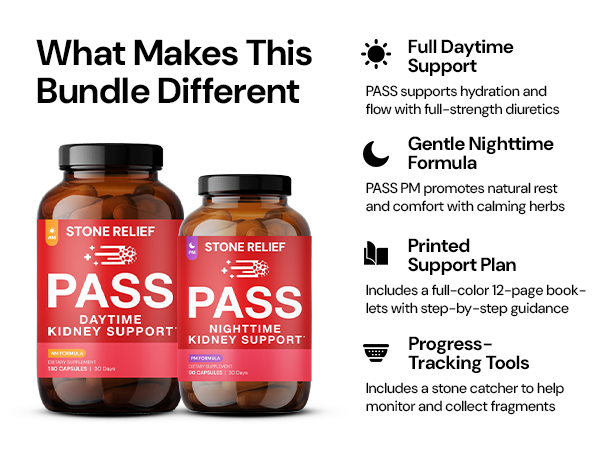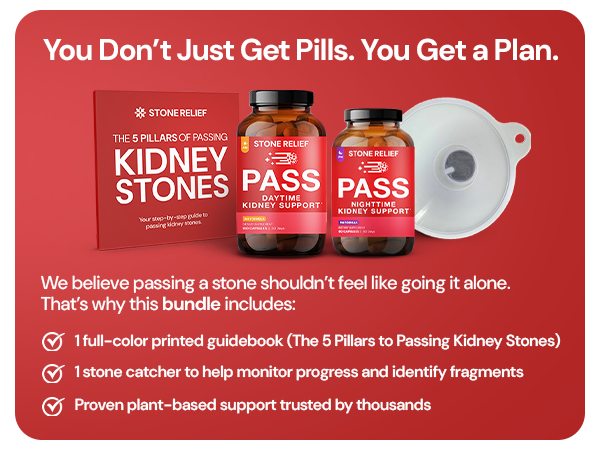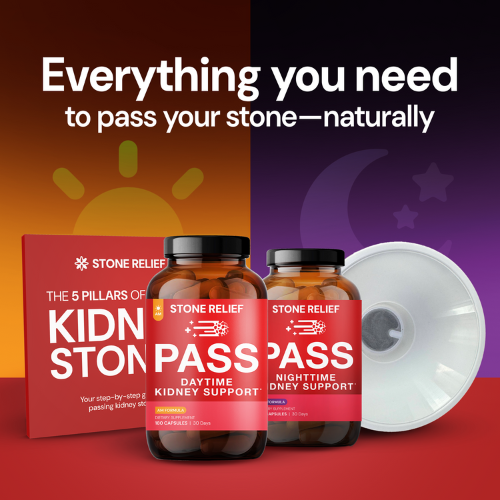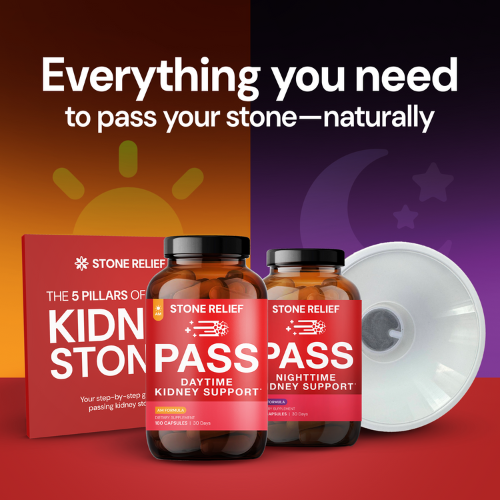Low Diuresis: A Hidden Risk for Kidney Stones
If you’re struggling with kidney stones, low diuresis could be a major hidden factor. Learn what low diuresis is, what causes it, and how you can fix it naturally.
Key Takeaways
-
Low diuresis means low urine volume, which increases kidney stone risk.
-
Drinking more water is the fastest fix for most people.
-
Medical issues like prostate problems or kidney disease can also cause low diuresis.
-
Medications like NSAIDs and antibiotics may worsen low urine output.
If you form calcium oxalate kidney stones, there's a chance you're suffering from low diuresis without even realizing it. In today's post, I’m going to break down what low diuresis is, why it matters, and the simple changes you can make to lower your risk for kidney stones.
Let’s dive in.
What Is Low Diuresis?
Simply put, low diuresis means low urine volume.
When your body isn’t passing enough urine, you're at a higher risk for forming kidney stones.
In medical terms, low diuresis is defined as less than two liters of urine output per day, or about 64 ounces. When you don’t pass enough urine, bad things start to happen inside your kidneys.
Your urine becomes more concentrated.
That means there are more stone-forming particles—like calcium and oxalate—floating around.
And the longer they sit together, the higher the chance they bind and start forming a stone.
Time is the enemy here. The less you pee, the more time those dangerous particles have to clump together.
🛒 Check Price & Purchase Stone Relief Pass AM/PM Bundle on Amazon
What Causes Low Diuresis?
Now that you know what low diuresis is, let’s explore the reasons why it might be happening.
Low Water Intake
This one is the most obvious.
If you don't drink enough water, you won't produce enough urine.
Simple, but so many people underestimate how much they really need to drink.
Prostate Issues
If you're a man with an enlarged prostate, you might not be able to empty your bladder fully.
This means urine sits longer in your system, increasing the risk of stone formation.
Chronic Kidney Disease
Your kidneys filter waste from your blood to create urine.
If you have chronic kidney disease, your kidneys aren’t filtering as much, leading to lower urine output—and a greater risk of stone formation.
Heart and Lung Conditions
Your heart pumps blood to your kidneys.
If your heart or lungs aren’t working well, less blood gets processed, meaning less urine is made.
Medications
Certain medications mess with urine production too.
Here are the main culprits:
-
NSAIDs like ibuprofen (they reduce blood flow to kidneys)
-
Antibiotics
-
Chemotherapy drugs
-
Immunosuppressants
If you’re using any of these regularly, you might be unknowingly setting yourself up for low diuresis.
🛒 Check Price & Purchase Stone Relief Pass AM/PM Bundle on Amazon
How to Fix Low Diuresis
Thankfully, for most of us, there are some simple fixes.
Drink More Water
This sounds basic, but it's your biggest weapon.
The American Urological Association recommends at least three liters a day—or about 96 ounces—to stay properly hydrated.
When you drink enough water, you:
-
Lower urine concentration
-
Flush out dangerous particles faster
-
Give less time for stones to form
I know three liters sounds like a lot, but trust me—it’s worth it if you’re serious about preventing stones.
Address Underlying Medical Issues
If you have an enlarged prostate, natural options like saw palmetto might help reduce the size and inflammation.
If you have kidney or heart conditions, you need to work closely with your doctor to optimize your treatment plan.
Fix the root issue, and you’ll naturally pass more urine—reducing your kidney stone risk.
Reevaluate Your Medications
Many over-the-counter meds like NSAIDs can drastically cut down blood flow to your kidneys.
This reduces urine output, creating the perfect storm for stones.
If you use NSAIDs or other medications regularly, talk to your doctor about safer alternatives.
Cutting back could significantly improve your urine volume—and your kidney health.
Why Managing Low Diuresis Matters
When you have low diuresis, your kidneys are forced to hold onto high concentrations of stone-forming materials.
Over time, they start sticking together, growing larger, and turning into painful kidney stones.
By fixing your hydration, addressing medical issues, and being smart about your medications, you can take control of your urine volume—and your kidney stone risk.
It doesn’t take complicated diets or expensive supplements to make a huge difference.
Sometimes, it’s as simple as more water and smarter choices every day.
Stay tuned for more kidney stone tips—and remember, your best defense starts with prevention.
🛒 Check Price & Purchase Stone Relief Pass AM/PM Bundle on Amazon








